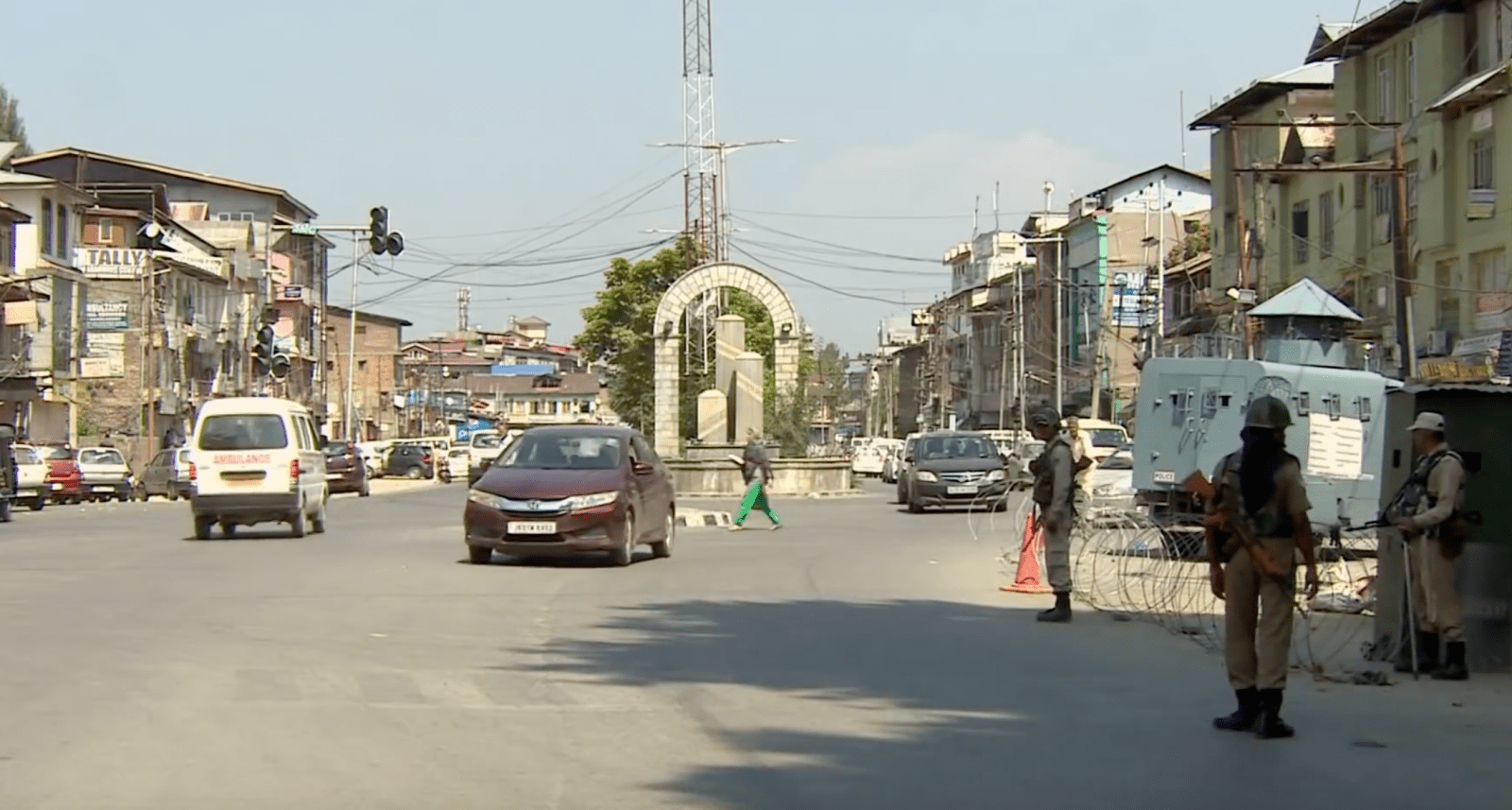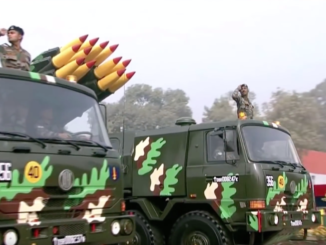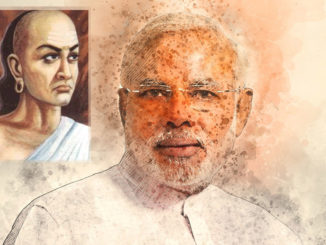 On 5th August 2019, an Indian presidential decree proposed by India’s Hindu nationalist governing party, the Bharatiya Janata Party (BJP), revoked the special status of Indian-occupied Kashmir (IoK), dividing the state into two parts: Jammu and Kashmir, and Ladakh, bringing them under direct control of New Delhi as Union Territories. The changes are aimed at altering demographics in the valley to challenge the Muslim majority characteristic of the state. A day before announcing the abrogation of Articles 370 and 35A, India moved an additional 25,000 troops in the valley. Indian authorities have since cut off all means of communication – landline and internet – within the valley and with outside world.
On 5th August 2019, an Indian presidential decree proposed by India’s Hindu nationalist governing party, the Bharatiya Janata Party (BJP), revoked the special status of Indian-occupied Kashmir (IoK), dividing the state into two parts: Jammu and Kashmir, and Ladakh, bringing them under direct control of New Delhi as Union Territories. The changes are aimed at altering demographics in the valley to challenge the Muslim majority characteristic of the state. A day before announcing the abrogation of Articles 370 and 35A, India moved an additional 25,000 troops in the valley. Indian authorities have since cut off all means of communication – landline and internet – within the valley and with outside world.
The detention and house arrest of Hurriyat leaders had always been a norm. But India set a new normal when authorities arrested IoK’s political leaders such as Mehbooba Mufti and Omar Abdullah, both former Chief Ministers. Apart from these arrests, Indian forces have arrested more than 4,000 Kashmiris since 5th August; many of those detained have been moved outside Kashmir as prisons in the latter have reached capacity. Authorities have declined to provide actual numbers of people taken into custody, apart from confirming more than 100 local politicians, activists and academics who were detained during the first few days of the curfew; on the whole, the entire valley has been under a complete lock down for nearly three weeks.
How does Pakistan see the Kashmir dispute?
Prior to the independence of Pakistan and India, the question of Jammu and Kashmir stood undecided. The Muslims, who were in majority in the valley wished to join Pakistan. The National Conference, the claimant secular party, was aligned to then Congress party seeking an independent state, but sided with British India or later independent India. The dispute of Jammu and Kashmir erupted when the then princely state’s ruler Maharaja Hari Singh discarded his decision to remain independent after Partition and, contrary to the wishes of the Muslim majority population, decided to accede to India. Before the decision could be implemented, the Muslim population in Poonch rebelled against the Dogra dynasty; at the same time, the Muslim population in Jammu was subjected to massacre by Hindu and Sikh extremists in support of Maharaja Hari Singh and the right wing paramilitary organization Rashtriya Swayamsevak Sangh (RSS). Fearing he would lose his hold on the state, Hari Singh decided to accede to India. This triggered an intervention from Pakistan which understood the plight of people in Jammu and Kashmir, and decided to check any moves of the latter’s occupation which were not in consonance with its people’s wishes.
Quaid-e-Azam Muhammad Ali Jinnah understood the situation of the subcontinent’s Muslims even prior to independence of both India and Pakistan. He respected the religious sensibilities of the Hindu and Sikh population of Jammu and Kashmir and, in his last visit to Kashmir in 1944, urged the Muslims there to retain their ethos of inclusiveness. At the same time, he reminded them of the predicament of being subjected to majoritarian impulses and further systematic discrimination from the Dogra dynasty. However, Hari Singh’s premature and undemocratic accession led to intervention from Pakistan to thwart Indian. This led to the First Kashmir War between India and Pakistan, which began in October 1947 and lasted until January 1949. The United Nations Security Council, since January 1948, has adopted various resolutions after India took the matter to the global platform. These resolutions reiterated the demand for holding a plebiscite. India’s then Prime Minister Jawaharlal Nehru, on various occasions, iterated India’s commitment that Kashmiris would be allowed to exercise their right of self-determination under the UN Charter and Universal Declaration of Human Rights. Later, India backtracked from its commitment, despite UNSC resolution 98 of December 1952 which directed that the commitment to plebiscite be upheld.
Furthermore, India has always used the Simla Agreement of 1972 as an instrument which precludes any involvement of multilateral institutions or third party mediation and arbitration. Although Article 1 (i) states that “the principles and purposes of Charter of United Nations shall govern relations between the two countries.” Similarly, Article 1 (ii) states “the two countries are resolved to settle their differences by peaceful means through bilateral negotiations or by any other peaceful means mutually agreed between them.” Nowhere does the Agreement reduce the nature of dispute settlement between India and Pakistan to bilateralism; rather it allows the involvement of multilateral actors for settlement of differences and disputes. By bifurcating the Jammu and Kashmir State into the Jammu and Kashmir, and Ladakh union territories, India also violated Article 4 (ii) of the Simla Agreement which prevents both sides from unilaterally changing the status of the Line of Control. India’s recent move under the BJP to abrogate Article 35-A and 370 of the Indian Constitution not only violates the 1972 agreement but also seeks to alter the demographics of Jammu and Kashmir by reducing the local population to a minority. Although, Pakistan has never accepted the legality of Article 35-A and 370; however, these articles provided so-called protections which prevented changes to the demographic character of Jammu and Kashmir. Most importantly, Security Council Resolution 122 of 1957 observed upon the convening the Constituent Assembly in Indian occupied Jammu and Kashmir that “any action that assembly may have taken or might attempt to take to determine the future shape and affiliation of the entire state or any part thereof, or action by the parties concerned in support of any such action by the assembly, would not constitute a disposition of the state in accordance with the principles”[1] laid down by previous resolutions of the Security Council and UNCIP.[2] Therefore any measures that are claimed to be taken on behalf of the people of Jammu and Kashmir lack legal credence and grounds.
Indian Misperceptions and Internationalization of Kashmir Dispute
The Indian leadership’s perceptions of the current geopolitical landscape of South Asia in particular and Asia in general, played an important role in its decision. Internally, Pakistan is at present facing diverse economic challenges on multiple fronts such as the task of shoring up its foreign exchange reserves, revitalizing its exports, curbing high inflation, adjusting its fiscal deficit and current account deficits. Externally also, Pakistan is confronted with manifold challenges such as meeting compliance of the Financial Action Task Force (FATF), playing its constructive role of facilitating the Afghan peace process, and Government of Pakistan’s continuous and indefatigable efforts to take Pakistan’s perspective to the world. India has articulated a flimsy and mistaken narrative stating that after September 2019 the focus of the (so-called Pakistan-backed) Afghan Taliban might be on Jammu and Kashmir to initiate an insurgency; this overlooks Pakistan’s long struggle against extremism and terrorism. Embroiled with its circumstances, Indian political leaders might have misperceived that Pakistan is in a daunting position and will find it hard to focus on Kashmir. They may also believe that having painted Pakistan as an abettor of “terrorism” in Jammu and Kashmir, the international community will not heed Pakistan’s position. But the Indian establishment’s perceptions are found to have been misinformed and the world is taking heed of Kashmir’s plight.
With the abrogation of Articles 370 and 35A, followed by imposition of repressive measures, India itself internationalized the Jammu and Kashmir dispute, which paved the way for a United Nations Security Council (UNSC) meeting on Kashmir issue after 50 years on 16th August 2019. Pakistan’s diplomatic efforts yielded results, but this is not the end point for Pakistan.
The Government of Pakistan launched a diplomatic offensive against Indian atrocities in Indian Occupied Jammu and Kashmir, which succeeded in drawing the attention of various multilateral institutions to the ongoing curfew and repression by India since 5th August, including the Organization of Islamic Countries (OIC) and the UN. Pakistan’s Prime Minister Imran Khan, during his visit to New York next month to address the 74th session of United Nations General Assembly (UNGA), will highlight Kashmir’s current state of affairs and emphasize on the need for the international community to intervene due to the dispute’s global implications. US President Donald Trump’s repeated offers of mediation on Kashmir between India and Pakistan itself underscores the significant, critical and international nature of the conflict.
The Pakistani and Kashmiri diaspora is conducting massive protests in different capital from Washington, London, Paris, Brussels, Montreal and Wellington to Kuala Lumpur, Tokyo, Seoul and Tehran. Protestors across the world demanded that the UN should compel India to restore the region’s autonomy and give its people the right to exercise self-determination under UNSC resolutions. Unlike previous episodes in the Kashmir crisis, international media has played a noteworthy role in highlighting the actual situation in the Kashmir valley and India’s brutal measures against Kashmiri people.
The Perilous Path and Way Forward
The dispute of Jammu and Kashmir is not only a question of territory, but the question of right to self-determination of a repressed population under repeated UNSC Resolutions. Pakistan, therefore, feels obligated to provide comprehensive assistance to the people in their plight against India’s occupation and repression. The prime rationale for it is that Pakistan itself came into being after a democratic struggle in India’s Muslim majority provinces and the voluntary accession of Muslim majority princely states to Pakistan. Those princely states had geographical contiguity with the newly formed state of Pakistan, and the same applies to the geographically contiguous and Muslim majority state of Jammu and Kashmir. The rationale for denying people of Jammu and Kashmir their right to plebiscite for so many decades is Indian fears of a verdict coming out against it. The matter for Pakistan and Kashmiri people is the preservation of their centuries’ old ethos, culture, faith, population, political and economic autonomy, which will be under assault from BJP’s revisionist and expansionist political ambitions. The fear for this is rightly founded as BJP draws inspiration from the RSS which seeks to re-establish Hindu glory in India. The people of Jammu and Kashmir are under threat of being made subjected to the same horrible fate that Jews were put to at the hands of Nazi Germany.
The middle ground of seeking “self-determination” through a democratic instrument of plebiscite appears grim, given BJP’s majoritarian and fascist ambitions to alter the demography of the Indian occupied territory. It has also ruled out the possibility of adopting a course of dialogue, either with the Kashmiri population, Pakistan or by means of multilateral intervention. This intransigent approach from India under the BJP threatens the peace of Jammu and Kashmir. The social contract between its people and India’s center, which once gave Kashmiris hope for a civilized, diplomatic recourse to settlement of this dispute, appears to be waning.
The preservation of the democratic, fundamental and inherent right of the people of Jammu and Kashmir, i.e. self-determination, is something which will continue to remain integral to Pakistan’s foreign policy. After even having been dismembered from its Eastern wing after the 1971 War, Pakistan did not forego its claim for the settlement of Jammu and Kashmir dispute in light of people’s aspirations.
The growing resentment in people of Jammu and Kashmir in face of the denial of their fundamental and democratic right under UNSC resolutions from India will only worsen the existing crisis. This resentment makes violent reprisals more likely. India, rather than living up to its democratic credentials, appears inclined and satisfied to violate people’s rights through the use of violence. In the eventuality of an existential threat posed by India, particularly fears of massacres and incessant violence, Pakistan will feel the pressure to do more at the political, diplomatic and moral ends of its policy towards Kashmir.
The India-Pakistan War of 1971 has taught the vital lesson of “never again” to the people of Pakistan. Its national character has been shaped by crises, disasters, conflicts and political experiences for decades since. Pakistan as it appears will go to all lengths to accomplish the Kashmiris’ right to self-determination. Pakistan and its leadership perceives that “terrorism” in Kashmir was the excuse that India and BJP recently had used to alter the status-quo in Jammu and Kashmir. After 9/11, Pakistan continued to take steps to reduce non-state actor involvement in Indian occupied Jammu and Kashmir, a fact that has been corroborated with empirical studies.
Despite claims by Prime Minister Modi that economic prosperity will sweep the unilaterally annexed territories of Jammu and Kashmir, nothing could be farther from the truth. India’s economy is set to slow down to 5.7% in the second quarter of the current fiscal year, compared to 5.8% earlier this year in the first quarter. The promise of economic prosperity coming IoK following the abrogation of Article 370 and 35-A appears more dubious than credible, as under the BJP India experienced record unemployment in its last five years. Economic development is not the prime and sole instrument of integration or nation-building and it certainly will not change hearts in Kashmir either. Nations are integrated and built if they share a common vision, aspirations, history and culture and, above all, if the social contract is fulfilled. These critical and concrete pillars appear missing from India’s designs to expand its edifice of occupation in Jammu and Kashmir and refusing to give the people self-determination.
India may be tempted to reinitiate or seek to engage its proxies in Pakistan’s Balochistan province or to disturb the ongoing peace efforts in Afghanistan. It may also activate some militant activity through its proxies in Khyber Pakhtunkhuwa Tribal Districts, however, it is unlikely to dampen the strategic leadership’s resolve in Pakistan, even if Indian strategists presume that such recourse may break Pakistan’s national will or solidarity with Kashmir. Similarly, any efforts by India to threaten a conventional or nuclear war against Pakistan are likely to be deterred. Just as was done on 27th February 2019 when Pakistan retaliated to India’s airstrikes on Balakot.
The reason for Pakistan to sustain its efforts on Jammu and Kashmir remains simple. The Pakistani people and its leadership are committed helping the Kashmiri people realize their right of self-determination in a democratic, peaceful, and durable manner for lasting peace and stability in South Asia.
[1] Security Council Resolution 122 (1957). Available from
http://www.un.org/en/ga/search/view_doc.asp?symbol=S/RES/122(1957)
[2] Security Council Resolutions 47 (1948), 51 (1948), 80 (1950), 91 (1951), and the United Nations
Commission for India and Pakistan resolution of 13 August 1948 and 5 January 1949.
![]()




Be the first to comment